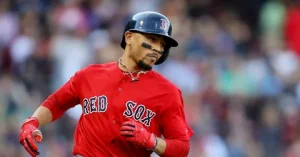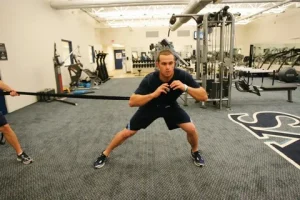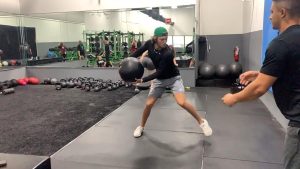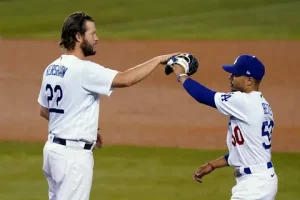Baseball is a game of skill, strategy, and adaptability. One of the most exciting trends in modern baseball is position flexibility the ability to play multiple positions well. Players like Mookie Betts, who recently transitioned from the outfield to shortstop, show how versatility can make you a valuable asset to any team. This article will explore how Betts’ move can inspire your training, with a focus on strength training for baseball hitters and strength training for the baseball swing. Let’s dive in!
Why Position Flexibility Matters
In today’s game, teams love players who can play more than one position. It gives coaches options and helps teams handle injuries or tough matchups. For example, if a star player gets hurt, a flexible player can step in and keep the team strong.

Mookie Betts is a perfect example. He’s already one of the best outfielders in the game, but when the Dodgers needed a shortstop, he stepped up. This move wasn’t easy, but Betts’ hard work and athleticism made it possible. His story teaches us that with the right training, anyone can learn to adapt.
Mookie Betts’ Transition: What We Can Learn
Betts’ move from the outfield to shortstop wasn’t just about changing positions. It was about learning new skills and pushing his limits. Here’s what made his transition successful:
- Work Ethic: Betts practiced tirelessly to master the footwork and throwing angles needed for shortstop.
- Athleticism: His speed, agility, and strength helped him adjust quickly.
- Baseball IQ: Betts understands the game deeply, which helped him anticipate plays and make smart decisions.
These qualities didn’t just help Betts on the field they can inspire your training too.

Strength Training for Baseball Hitters
Whether you’re a hitter or a fielder, strength training is key to improving your game. For hitters, it’s all about building power and speed in your swing. Here’s how strength training can help:
- Core Strength: A strong core helps you generate power from your hips and torso.
- Rotational Power: Exercises like medicine ball throws and cable rotations improve your ability to twist and swing with force.
- Bat Speed: Stronger muscles mean a faster swing, which leads to harder hits.
Key Exercises for Hitters:
- Deadlifts
- Squats
- Medicine Ball Throws
- Rotational Cable Work
Mookie Betts’ Muscles
Mookie Betts may not be the biggest player on the field, but his muscles are built for speed, power, and control. His lean, strong frame helps him move quickly, swing fast, and throw with force. Mookie’s strength comes from smart training that focuses on his core, legs, and upper body. His powerful legs give him explosive speed for base running and fielding, while his strong arms and shoulders help him hit with precision and drive. He proves that muscle isn’t just about size it’s about using strength the right way for baseball success.
Strength Training for the Baseball Swing
A powerful swing starts with strong legs, hips, and shoulders. Strength training can help you develop the explosive movements needed for a great swing. Here’s what to focus on:
- Explosive Hip Movement: Your hips drive the power in your swing. Exercises like kettlebell swings can help.
- Shoulder Strength: Strong shoulders help you control the bat and generate speed.
- Rotational Strength: This helps you twist your body efficiently during the swing.
Key Exercises for the Swing:
- Kettlebell Switches
- Plyometric Push-Ups
- Resisted Band Rotations
How Strength Training Helps with Position Flexibility

Strength training isn’t just for hitters it’s also crucial for players who want to be versatile. Here’s why:
- Improved Athleticism: Strength training makes you faster, stronger, and more agile, which helps you play multiple positions.
- Injury Prevention: Strong muscles protect your joints and reduce the risk of injury.
- Better Performance: Whether you’re hitting, fielding, or throwing, strength training helps you perform at your best.
What Does an Athletic Trainer Do?
An athletic trainer helps athletes stay healthy, recover from injuries, and improve their physical performance. They work closely with coaches, doctors, and athletes to prevent injuries before they happen. If someone gets hurt, athletic trainers step in to treat the injury, create a recovery plan, and guide the athlete back to full strength. They also teach athletes how to stretch, warm up, and train the right way to stay safe. Whether it’s on the field, in the gym, or during rehab, athletic trainers play a key role in keeping athletes strong and ready to compete.
Training Tips for Position Flexibility
If you want to be a versatile player like Mookie Betts, here are some tips to follow:
- Master the Basics: Work on your footwork, throwing mechanics, and positioning for each position.
- Practice Drills: Include drills for infield, outfield, and hitting in your routine.
- Build Strength: Focus on exercises that improve your overall athleticism and power.
- Study the Game: Watch videos and learn from experienced players to improve your baseball IQ.
Example Training Plan
Here’s a simple weekly plan to help you build strength and flexibility:
| Day | Focus | Exercises |
| Monday | Strength Training | Deadlifts, Squats, Medicine Ball Throws |
| Tuesday | Infield Drills | Ground Balls, Double-Play Turns |
| Wednesday | Hitting Practice | Batting Cage, Rotational Cable Work |
| Thursday | Outfield Drills | Fly Balls, Crossover Steps |
| Friday | Strength Training | Kettlebell Swings, Plyometric Push-Ups |
| Saturday | Game Simulation | Live Batting, Situational Fielding |
| Sunday | Rest/Recovery | Stretching, Light Conditioning |
Love, Laughs & Surprise: The Most Talked-About MLB Kiss Cam Moment of the Season
During a recent MLB game, fans were treated to an unexpected and hilarious kiss cam moment that quickly went viral across social media. As the camera panned through the crowd, couples leaned in for the classic kiss but one pair stole the spotlight. Just as the iconic Coldplay song “Fix You” began playing over the stadium speakers, the man on screen stood up, dropped to one knee… and instead of kissing his date, he pulled out a ring. What was supposed to be a cute kiss cam turned into a surprise proposal, drawing cheers, gasps, and a standing ovation from the crowd. Moments like these are exactly why fans love the unpredictability of MLB kiss cams. Whether it’s a sweet kiss, a rejected smooch, or a grand romantic gesture set to emotional music, these segments bring fans together through laughter and feel-good vibes. The added touch of Coldplay’s heartfelt tune made the moment even more cinematic, sparking thousands of shares online. It’s just another reminder that baseball is about more than just the game it’s also about the love stories and memories made in the stands.
Conclusion
Mookie Betts’ transition to shortstop shows how hard work, athleticism, and a willingness to adapt can make you a better player. By focusing on strength training for baseball hitters and strength training for the baseball swing, you can improve your game and become more versatile. Whether you’re a hitter, fielder, or both, the key is to train smart, stay dedicated, and always be ready to learn.





